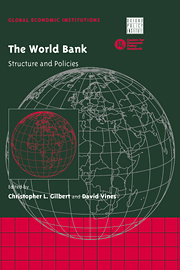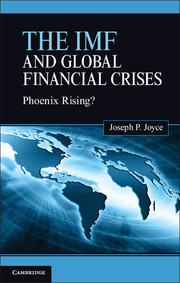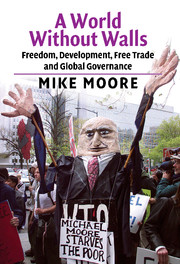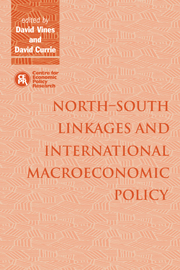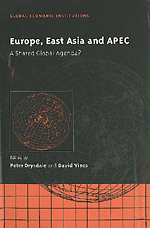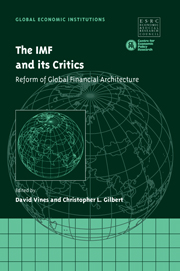
The IMF and its Critics
Reform of Global Financial Architecture
Part of Global Economic Institutions
- Editors:
- David Vines, University of Oxford
- Christopher L. Gilbert, Universiteit van Amsterdam
- Date Published: January 2009
- availability: Available
- format: Paperback
- isbn: 9780521100502
Paperback
Other available formats:
Hardback, eBook
Looking for an inspection copy?
Please email [email protected] to enquire about an inspection copy of this book
-
The IMF is the first economic institution in line to protect countries from the effects of financial crises and to insulate the world economy from possible systemic risk. However, many argue that the IMF is insufficiently equipped to do this job, while others argue almost the opposite: the IMF's well-intentioned actions induce other countries to take risks which increase their exposure from both universities and the multilateral agencies, combines rigourous economic analysis with insider perspectives on key policy debates. It analyses the Asian and Argentine financial crises of the late 1990s, issues of policy ownership, the more general quest for financial stability and governance of the IMF. It is an essential reference for anyone interested in the role of international financial institutions in our globalised economy.
Customer reviews
Not yet reviewed
Be the first to review
Review was not posted due to profanity
×Product details
- Date Published: January 2009
- format: Paperback
- isbn: 9780521100502
- length: 472 pages
- dimensions: 229 x 152 x 26 mm
- weight: 0.68kg
- contains: 11 b/w illus. 12 tables
- availability: Available
Table of Contents
Introduction
1. The IMF and international financial architecture: solvency and liquidity Christopher L. Gilbert, David Vines
2. Progress towards greater international financial stability Andrew Crockett
3. International coordination of macroeconomic policies: still alive in the new millennium? Lawrence H. Meyer, Brian M. Doyle, Joseph E. Gagnon, Dale W. Henderson
4. The Report of the International Financial Institution Advisory Commission: comments on the critics Allan H. Meltzer
5. Reforming the global financial architecture: just tinkering around the edges? Malcolm Knight, Lawrence Schembri, James Powell
6. The IMF and capital account liberalisation Dominic Wilson
7. How should the IMF view capital controls? Gregor Irwin, Christopher L. Gilbert, David Vines
8. The resolution of international financial crises: an alternative framework Andrew G. Haldane, Mark Kruger
9. Whose programme is it? Policy ownership and conditional lending James M. Boughton, Alex Mourmouras
10. The IMF and East Asia: a changing regional financial architecture Gordon de Brouwer
11. The role of the IMF in developing countries Graham Bird, Paul Mosley
12. Argentina and the Fund: anatomy of a policy failure Michael Mussa
13. Countries in payments' difficulties: what can the IMF do? Andrew Powell
14. Accountability, governance and the reform of the IMF Ngaire Woods
15. The IMF at the start of the twenty-first century: what has been learned? On which values can we establish a humanised globalisation? Michel Camdessus
Index.
Sorry, this resource is locked
Please register or sign in to request access. If you are having problems accessing these resources please email [email protected]
Register Sign in» Proceed
You are now leaving the Cambridge University Press website. Your eBook purchase and download will be completed by our partner www.ebooks.com. Please see the permission section of the www.ebooks.com catalogue page for details of the print & copy limits on our eBooks.
Continue ×Are you sure you want to delete your account?
This cannot be undone.
Thank you for your feedback which will help us improve our service.
If you requested a response, we will make sure to get back to you shortly.
×
